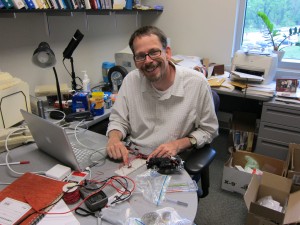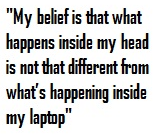 Dr. Tim Oates pursues research in the field of machine learning and is fascinated by the development of the human brain.
Dr. Tim Oates pursues research in the field of machine learning and is fascinated by the development of the human brain.
Dr. Tim Oates, associate professor of computer science, turned a childhood fascination with robots and science fiction into a career of rewarding research in the field of artificial intelligence. Currently, Dr. Oates is working on several threads of research. One project, a medical collaboration, deals with interpreting medical time series, while another pursuit, his true fascination, deals with understanding human brain development.
A year ago, Dr. Oates began three separate collaborations with medical organizations–Intelomed, Shock Trauma, and the U.S. Air force– to develop non-invasive methods to predict the severity of brain damage by looking at external factors, like medical time series, opposed to the invasive and potentially life-threatening surgical methods that are currently in practice. Specifically, Oates and his collaborators have been working with traumatic brain injury patients who are at risk of dangerous brain swelling as a result of increased intracranial pressure. Their goal is to be able to gauge the severity of the patient’s condition using vital signs in order to avoid unnecessarily drilling holes into the skulls of patients.
In addition to his work in the medical sphere, Dr. Oates is especially interested in understanding the development of the human brain—an interest which sparked watching his three daughters grow up. His research deals with sensory motor learning: “How is it that you and I acquire the knowledge that we use to move around the world, to do things in the world, and to talk about the world.” The computer is the best model for how the human brain works, says Dr. Oates. Both the brain and the computer take in information, process it, and produce outputs.
 Dr. Oates is also fascinated by the idea of making robots that are capable of learning. The ultimate goal of his career would be to develop a robot who functions like a human child: “the idea is that we would develop a suite of algorithms that would allow you to take a robot that has some unspecified ability to take actions in the world and some sensors, and you would turn that thing on and those learning algorithms would allow the robot to go through a similar trajectory that children go through,” he explains.
Dr. Oates is also fascinated by the idea of making robots that are capable of learning. The ultimate goal of his career would be to develop a robot who functions like a human child: “the idea is that we would develop a suite of algorithms that would allow you to take a robot that has some unspecified ability to take actions in the world and some sensors, and you would turn that thing on and those learning algorithms would allow the robot to go through a similar trajectory that children go through,” he explains.
Nevertheless, Dr. Oates recognizes the deep philosophical implications concerned with constructing a robot with the capacity to learn. “There is this sense among many people that what makes us human is in some sense our ability to sit and have conversations,” he says. Developing a robot with human characteristics might call into question whether or not humans are any different from machines.
“My stance is that we’re machines,” says Dr. Oates. “My belief is that what happens inside my head is not that different from what’s happening inside my laptop,” he adds. If robots and humans aren’t fundamentally different, perhaps the prospect of creating a human-like robot might not be just a far-fetched science-fiction fantasy. “I don’t know if we’ll ever have androids walking among us that are indistinguishable from humans,” he says, “but I bet we’ll get pretty darn close.”